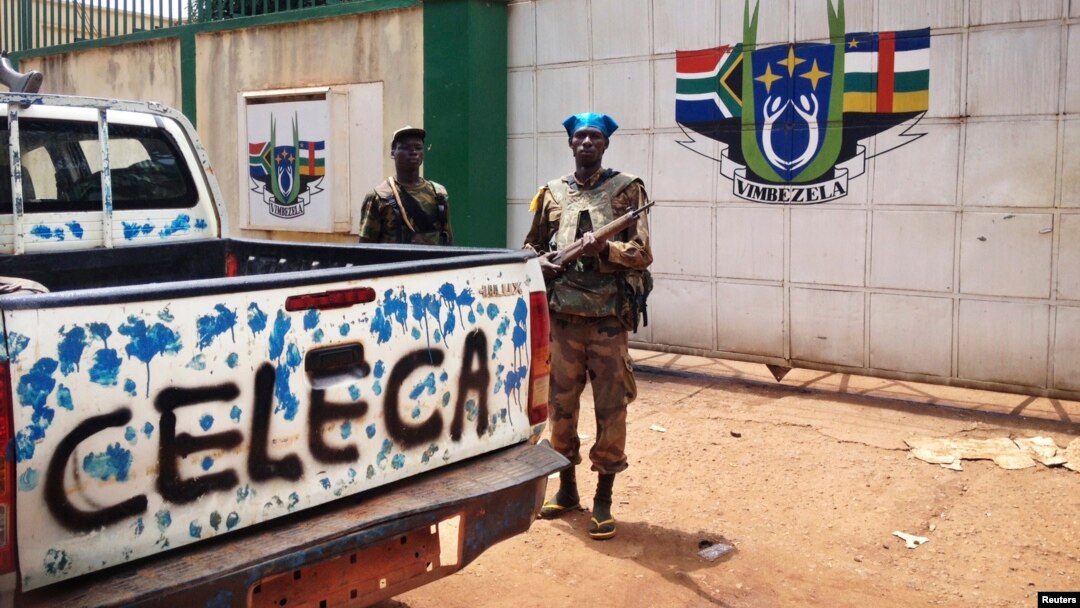DAKAR —
The U.N. assistant secretary-general for human rights, Ivan Simonovic, is calling for strengthening the regional security force (FOMAC) in the Central African Republic. U.N. Assistant Secretary General for Human Rights Ivan Simonovic said ongoing instability since the March 24 rebel coup could intensify ethnic and religious divisions, and that humanitarian aid remains largely insufficient.
The humanitarian situation continues to deteriorate following the ousting of former President Francois Bozize by the Seleka rebel coalition. Civilians continue to report widespread human rights violations, including arbitrary arrest, rape, torture, looting and summary executions.
During a visit to the country this week, Simonovic said that security in CAR remains "virtually non-existent," particularly outside the capital, and that state institutions are "close to collapse."
He said respect for human rights is paramount in resolving the crisis. “Violations of human rights are the root causes of this conflict and reflect the current situation. Preventing further violations and ensuring respect of all human rights for all is a way to end conflict and to achieve reconciliation and sustainable peace, stated Simonovic. "Without security, there will be no return, no social services, no agricultural and no economy.”
A regional force, known as FOMAC, was created by the Economic Community of Central African States and was deployed in the CAR last December as the Seleka rebellion gained momentum.
The number of FOMAC troops has been increased since the rebel takeover on March 24th. However, Simonovic says still more are needed, and says the U.N should also send international troops.
Other priorities, he said, include the continued disarmament of Seleka fighters and increased funding for humanitarian aid for more than 200,000 people that the U.N. says have fled their homes since December because of insecurity.
Aid agencies say they have received less than a third of the funding requested for this year. Simonovic said disease, malnutrition and maternal mortality are on the rise and less than 20 percent of health care facilities are operational.
Insecurity and logistical issues have made it difficult for aid agencies to operate outside the capital, Bangui. U.N. aid agencies have yet to redeploy nationwide, after withdrawing their operations to Bangui at the start of the rebellion in December.
The humanitarian situation continues to deteriorate following the ousting of former President Francois Bozize by the Seleka rebel coalition. Civilians continue to report widespread human rights violations, including arbitrary arrest, rape, torture, looting and summary executions.
During a visit to the country this week, Simonovic said that security in CAR remains "virtually non-existent," particularly outside the capital, and that state institutions are "close to collapse."
He said respect for human rights is paramount in resolving the crisis. “Violations of human rights are the root causes of this conflict and reflect the current situation. Preventing further violations and ensuring respect of all human rights for all is a way to end conflict and to achieve reconciliation and sustainable peace, stated Simonovic. "Without security, there will be no return, no social services, no agricultural and no economy.”
A regional force, known as FOMAC, was created by the Economic Community of Central African States and was deployed in the CAR last December as the Seleka rebellion gained momentum.
The number of FOMAC troops has been increased since the rebel takeover on March 24th. However, Simonovic says still more are needed, and says the U.N should also send international troops.
Other priorities, he said, include the continued disarmament of Seleka fighters and increased funding for humanitarian aid for more than 200,000 people that the U.N. says have fled their homes since December because of insecurity.
Aid agencies say they have received less than a third of the funding requested for this year. Simonovic said disease, malnutrition and maternal mortality are on the rise and less than 20 percent of health care facilities are operational.
Insecurity and logistical issues have made it difficult for aid agencies to operate outside the capital, Bangui. U.N. aid agencies have yet to redeploy nationwide, after withdrawing their operations to Bangui at the start of the rebellion in December.


